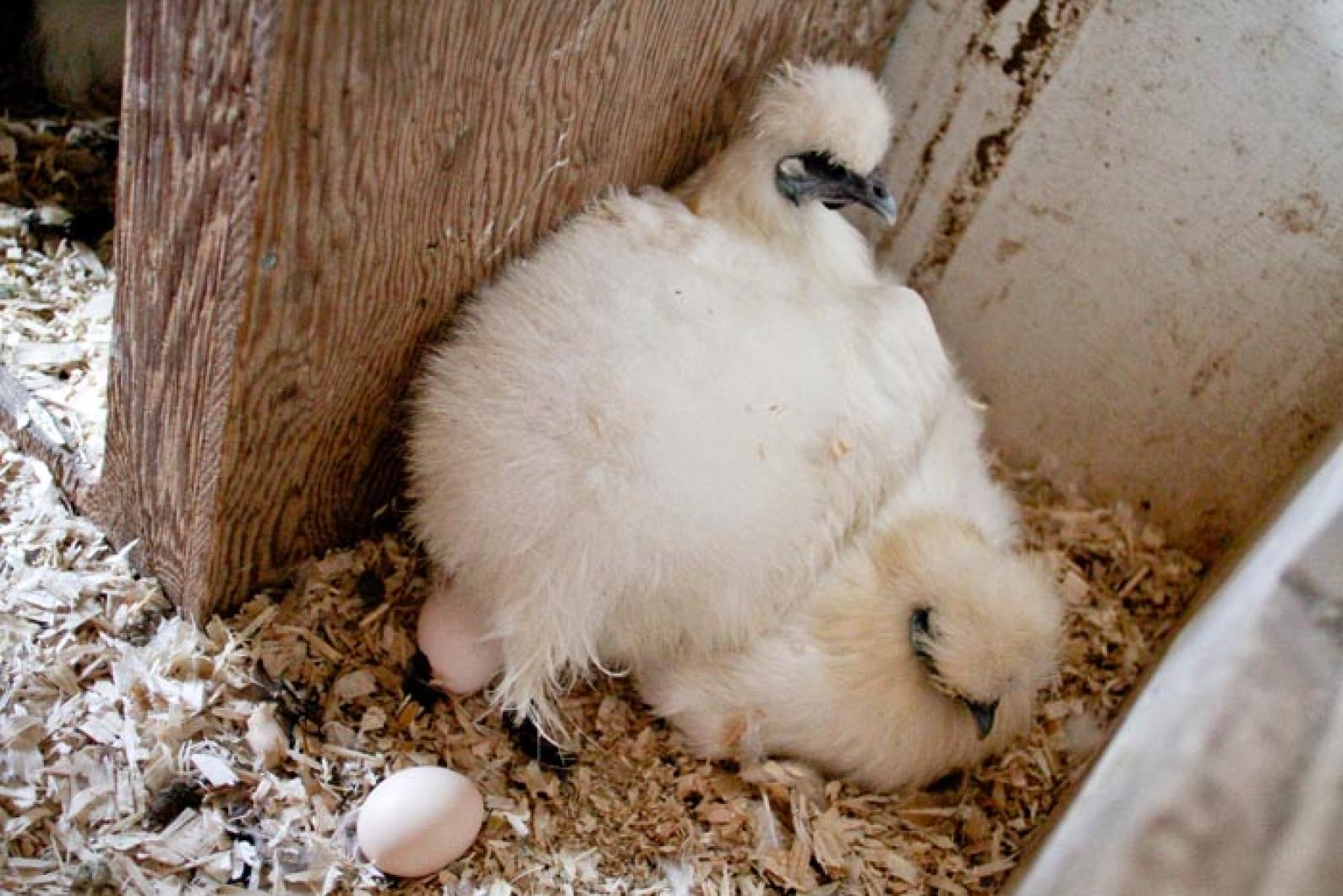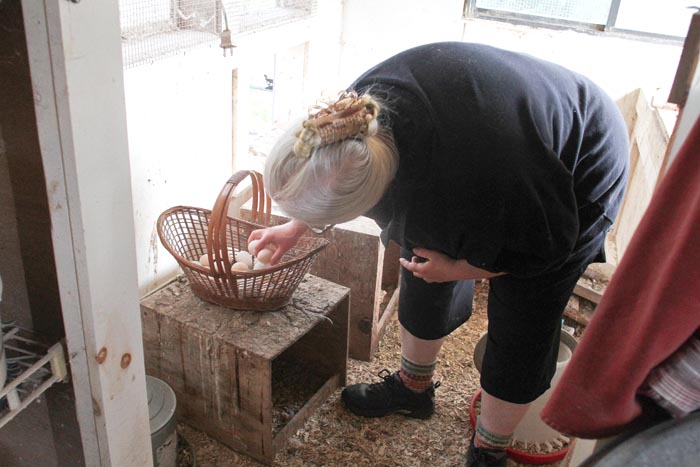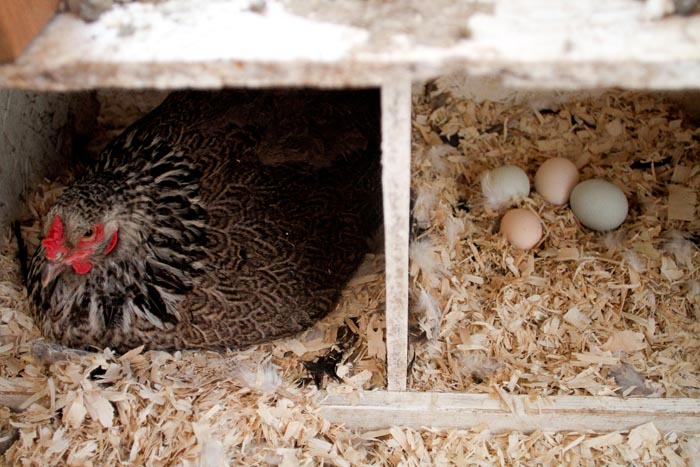What came first — the chicken or the egg? It’s one of those questions that has plagued the human race for ages, but Up-Island Eggs owner Katherine Long settled the debate on Friday afternoon as she was giving her chickens a treat of corn.
“The thing that laid an egg wasn’t a chicken, the thing that hatched out of the egg was the chicken,” Ms. Long said. “Whatever laid the egg first was something else. The egg came first.”
Ms. Long has 60 chickens at her West Tisbury home, which lay between one dozen and two dozen eggs a day. She’s been raising chickens for eggs for 12 years, and if ever there were an expert on what it takes to get the perfect egg, it is Ms. Long.
Her eggs vary in size and color, but always with the same fresh taste. But there’s more to an egg than just checking to make sure your dozen in the carton aren’t cracked. It takes time, care and a carefully balanced diet to make those scrambled eggs come out smooth and yellow.
“The most important part about eggs is the chicken needs to have enough protein in its diet to make the egg and enough calcium in its diet to make the shell,” Ms. Long explained. “But the flavor of the egg comes from it eating chlorophyll, lots and lots of greens. When people talk about farm fresh eggs, it’s one thing to talk about the freshness of the egg but it’s another thing talking about the flavor of the egg.
“You can have a perfectly fresh egg but not have that incredible flavor unless a chicken has a lot of greenery in its diet.”
Ms. Long’s chickens are free to wander in and out of the coops and graze on the grass, but that’s supplemental to their main diet of pellets, table scraps and corn as an afternoon treat.
There are ways to fake the rich yellow color (by feeding the chickens marigold seeds) but there’s no way to fake the flavor. The size of the egg depends on the size of the chicken, the color of the egg depends on the genetic makeup of the chicken, but the flavor of Ms. Long’s eggs is consistent because her chickens are all fed the same mix.
Eggs can be left unrefrigerated for up to a week. Many store-bought eggs are six weeks old, Ms. Long said, and that adds to the difference between a farm fresh egg and a commercial egg.
“When you crack a fresh egg open, that yolk ought to be nice and perky and round, especially if it’s cold,” she said. “With older eggs, once it’s been cracked it’s going to run.”
Ms. Long offered a tip for hardboiled egg fans – the older the egg the easier they are to peel. She’s been refrigerating a couple dozen eggs for three weeks.
Chickens lay eggs about five times a week, usually during the day, and the number of eggs produced from a chicken depends on the amount of daylight; the more light, the more eggs will be produced. Some farmers and large commercial operations force increased egg-laying by keeping lights on in large coops.
But like many other Island farms, Ms. Long’s chickens are raised the old-fashioned way of letting the sun dictate the natural order, so the next few weeks will be peak eggs season. At the end of summer, chickens begin to molt (grow a new set of feathers) to have a fresh set for the colder months ahead. When that happens, the protein that normally goes towards egg production is concentrated in growing feathers, Ms. Long said, and egg production slows down significantly in the cooler months as a result.
Once a hen lays an egg, she’ll sit on it for three weeks, but farmers gather their eggs once a day. Ms. Long collects them before the sun sets, after which the chickens will return to their coops for the night.
“When the hen goes to broodshe’s not sitting on her own particular eggs, other chickens will come lay eggs underneath her and she’ll brood them,” Ms. Long said. “Her body temperature goes up and she gets really fluffy and grumpy.”
Removing the eggs from the nest suspends the development of the embryo inside.
“Silkies are very good at being mamas,” she added, talking about a white chicken with black bones considered to be good luck in Chinese culture. “They will raise any egg, they don’t care what it is. They’d be perfectly happy to sit on a duck egg for all they know.”
The younger the hen the more eggs she’ll produce. Matured chicks begin laying eggs at six months old and can continue to produce eggs for about three years. Older hens’ eggshells also become thinner with age.
Ms. Long enjoys raising a variety of chickens, from Silkies to Ameraucanas, chickens which lay blue eggs. The original blue eggs come from a type of chicken called the Araucana, a South American variety. A chicken laying brown eggs that mates with a chicken laying blue eggs gives you a green egg.
They may be delicate, beautiful and delicious but Ms. Long said that due to the high cost of feed these days she barely breaks even. She approximated each one of her eggs are worth about 50 cents, but she charges $5 a dozen.
Morning Glory Farm in Edgartown is one of the only farms on the Vineyard large enough to make a profit from their eggs, gathering about 24 dozen a day right now, and owner Jim Athearn says that’s half as much as they normally get from their 800 chickens.
“Right now our production is low because in May we bought new pullets [young hens] and they haven’t started to lay as much yet,” he said in a phone interview this week. “Hopefully come a couple of weeks those young girls will kick in.”
Mr. Athearn said buying large quantities of feed (by the ton) and egg cartons keep costs down so the farm can make a profit. Their eggs vary in size as well, and prices start at $3.95 for a dozen.
“The chickens are raised the way they were 75 years ago, in a hen house that’s naturally ventilated,” Mr. Athearn said. “Nobody on the Island that I know of grows them in cages. In the industry that’s rare, but in small agriculture that’s the standard. We may be 40 years behind in how we raise them, but that’s the way we like it.”
This column is meant to reflect all aspects of agricultural activity and farm life on the Vineyard. To reach Remy Tumin, please call 508-627-4311, extension 120, or e-mail rtumin@mvgazette.com.









Comments
Comment policy »